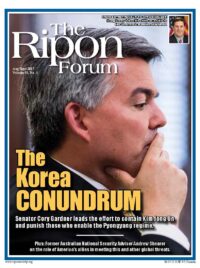 Should Senate Republicans abolish the filibuster? The filibuster is not specifically established by the U.S. Constitution. Then again, neither are political parties. Indeed, one could argue that the filibuster has persisted because it helps Congress fulfill its constitutional obligations by restraining the mischiefs of political parties.
Should Senate Republicans abolish the filibuster? The filibuster is not specifically established by the U.S. Constitution. Then again, neither are political parties. Indeed, one could argue that the filibuster has persisted because it helps Congress fulfill its constitutional obligations by restraining the mischiefs of political parties.
Filibustering: The Basics
If we want to understand filibusters, it helps to start with a clear definition. Filibustering is delay, or the threat of delay, in a legislative chamber to prevent a final outcome for strategic gain. Although the current focus is on the U.S. Senate, filibustering is a general phenomenon. While collecting data on filibusters in the modern Senate, I found references to filibustering in 20 state legislatures, 19 foreign countries, and the United Nations.
There are many ways to kill time. We might associate Senate filibustering with long speeches, but this is because pro-segregation southern senators opposed to civil rights bills during the mid-20th century favored germane speeches as the most legitimate form of obstruction. However, legislators can also delay by calling for unnecessary roll call votes, such as motions to adjourn for the day. Another classic technique is refusing to cast a vote in the hopes of
“breaking” a quorum so that there are not enough legislators participating to make legitimate decisions. This technique is known as a “disappearing quorum.”
Filibustering & the Constitution
As previously indicated, the Constitution does not explicitly state that filibustering should or must be allowed. As my book on filibustering explains, the modern Senate filibuster has come to play a critical role in the lawmaking process, on par with the constitutionally-mandated presidential veto. But it arose as an informal practice in the Senate rather than the deliberate design of the Founders.
The right to filibuster remains because senators realize they need one informal, extraconstitutional device to limit the excesses of another extraconstitutional innovation: political parties.
That said, two clauses of the Constitution create the potential for filibustering. The first clause allows a minority of the chamber to call for a roll call vote: “the yeas and nays of the members of either House on any question shall, at the desire of one fifth of those present, be entered on the Journal.” In the 19th and 20th centuries, members of both chambers availed themselves of this clause to force dozens of procedural roll call votes.
A second clause makes it possible for a minority to break a quorum if there are some members absent for innocent reasons: “a majority of each [chamber] shall constitute a quorum to do business.” This latter clause was discussed in the Constitutional convention on August 10, 1787. John Mercer pointed out that a majority quorum requirement would allow a minority to filibuster, to which George Mason pointed out that a bit of quorum-breaking can be a good thing, as it was used in Virginia to defeat populist measures that harm the economy. A motion to lower the threshold lost, 2 to 9.
In Federalist 58, James Madison argues against the opposite proposal, using the term “secession” for a disappearing quorum:
“Lastly, [a higher quorum requirement] would facilitate and foster the baneful practice of secessions, a practice which has shown itself even in states where a majority only is required; a practice subversive of all the principles of order and regular government; a practice which leads more directly to public convulsions and the ruin of popular governments than any other which has yet been displayed among us.”
On the other hand, critics of the filibuster argue that the Constitution already spells out all the supermajority requirements for legislative action (2/3 for treaties, removal, expulsion, Constitutional
amendments) so the 60-vote threshold for most legislation to clear the Senate is an additional and unintended hurdle in the process.
However, both chambers of Congress embrace supermajority requirements as a regular part of their rules. About half the bills that pass the House do so under “suspension of the rules,” which requires a two-thirds threshold in the House. House rules also allow for passing bills on the “Corrections Calendar” by a 3/5 vote, for waiving Calendar Wednesday by a 2/3 vote, and require a 3/5 majority to pass a tax increase.
Senate rules require a supermajority to waive the Budget Act for many amendments, and (following a 1915 precedent) a two-thirds vote is required to suspend the rules. These rules are adopted according to the Article One clause, which states that “each house may determine the rules of its proceedings,” and both chambers find good reason to apply supermajority thresholds to guide the legislative process.
In summary, the intent of the Founders is ambiguous. I think a fair summary is that they realized they were creating provisions that could be used to block legislation, and that filibustering could be good or bad for the public interest depending on the proposal that is being blocked or the demands made by the obstructionists. They left these decision in our hands.
Filibustering and Congress’s Constitutional Role
A more fruitful way to think about the constitutional role of filibustering is to assess whether it helps or prevents the Congress from fulfilling its constitutional duties. Congress has several basic roles, including:
- Representation — Each House and Senate member is tasked to speak for and act on behalf of their constituents. Voters are not just a means of attaining power; legislators are tasked to work for them.
- Deliberation — In the 18th century view of Congress, the benefit of gathering representatives from the far-flung states is that they can explain the problems and needs of their constituents to the rest of Congress. Before the Internet, Congressional staff, or think tanks, this was how Congress as an organization gathered enough information about the country to govern on its behalf.
- Action — Congress is the “First Branch” because it is supposed to be the driving force of our government, the great source of power and change. To do this, it must actually pass legislation.
Congress’s ability to act has been greatly enhanced by the development of permanent political parties. Parties help to coordinate the legislative agenda and to form coalitions behind major legislation. Yet, like the filibuster, they are extra-constitutional developments. The Founders neither expected nor approved of permanent political parties.
The efficiency which parties bring to the legislative process can come at an extreme cost. First, members of a majority party may be under intense pressure to conform to the party’s views, even if it means ignoring the views and interests of their constituents. Second, a majority party may not have any interest in genuine deliberation. It may develop its proposals in secret party meetings and then try to pass it quickly with a minimum of debate. In particular, a majority party may prefer to deprive legislators of opportunities to offer amendments.
After all, if roll call votes on amendments threaten to disrupt the bargains made within the party caucus, then they are dangerous. If votes on amendments force majority party members to go on the record on issues they would prefer to duck, the amendments are dangerous. Left unchecked, majority parties may diminish the ability of Congress to adequately represent or deliberate.
Filibustering helps to restore the balance in the Senate. When majority parties try to limit debate and amendments, or attempt to strong-arm their own members into voting against their consciences or their constituents, senators are able to respond by invoking the power of the minority to say “no.” And by saying no, senators are not trying to keep the Senate from passing legislation; they are fighting for free debate and honest voting.
The debate over filibustering has raged in the Senate since the days of Woodrow Wilson. And yet the right to filibuster remains because senators realize they need one informal, extraconstitutional device to limit the excesses of another extraconstitutional innovation: political parties.
Gregory Koger is a professor of political science at the University of Miami. He is the author of Filibustering: a Political History of Obstruction in the House and Senate and Strategic Party Government: Why Winning Trumps Ideology. Portions of this essay were previously on the political science blog http://themonkeycage.org/ back when Dr. Koger was trying to convince Democrats that the filibuster was worth preserving.




